Pauline Baynes facts for kids
Quick facts for kids
Pauline Baynes
|
|
|---|---|
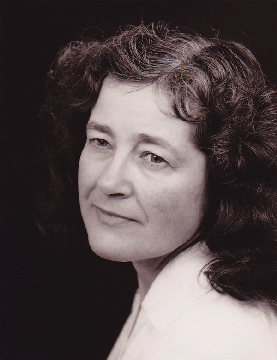
Portrait, c. 1974
|
|
| Born |
Pauline Diana Baynes
9 September 1922 |
| Died | 1 August 2008 (aged 85) Dockenfield, Surrey, England
|
| Education | Slade School of Fine Art |
| Known for | Illustration, mainly children's books |
|
Notable work
|
The Chronicles of Narnia A Map of Middle-earth |
| Spouse(s) |
Fritz Gasch
(m. 1961; died 1988) |
| Awards | Kate Greenaway Medal 1968 |
Pauline Diana Baynes (born September 9, 1922 – died August 1, 2008) was a talented English artist. She drew and painted pictures for over 200 books, mostly for children.
Pauline Baynes became famous for her amazing illustrations. She was the first artist to draw pictures for some of J. R. R. Tolkien's shorter books, like Farmer Giles of Ham. She also created the well-known cover art for The Hobbit and The Lord of the Rings. Plus, she made a cool poster map called A Map of Middle-earth.
One of her biggest achievements was illustrating all seven books in C. S. Lewis's Chronicles of Narnia series. Later in her life, she started writing and illustrating her own books, often about animals or stories from the Bible.
Contents
- Early Life and Adventures
- Learning to Be an Artist
- Art During World War II
- Illustrating The Chronicles of Narnia
- Bringing Narnia to Life
- Other Famous Works
- Working with J.R.R. Tolkien
- Pauline Baynes' Unique Style
- Awards and Recognition
- Pauline Baynes as an Author
- Personal Life
- Death
- Her Lasting Impact
- Interesting Facts About Pauline Baynes
- Images for kids
- See also
Early Life and Adventures
Pauline Baynes was born in Hove, England, on September 9, 1922. Her parents were Frederick and Jessie Baynes. She had one older sister, Angela. When Pauline was just a baby, her family moved to India. Her father worked there as a government official. The family spent their time in the city of Agra and in the cooler hill town of Mussoorie. Pauline loved her early years in India.
When she was five, her mother, who wasn't feeling well, took Pauline and her sister back to England. Pauline remembered crying as they left India. They moved around a lot in Surrey, staying with friends or in rented rooms. Her father stayed in India but visited his family for holidays.
Learning to Be an Artist
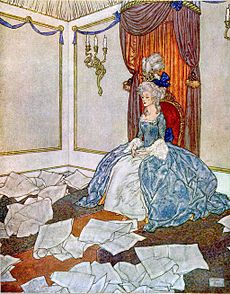
Pauline started school at a convent. The nuns there didn't understand her wild imagination or her ability to speak Hindi. When she was nine, she went to Beaufort School. Art was her favorite subject because it felt easy. By the time she left, she knew she wanted to be an illustrator. She even went back to Beaufort to teach art for two years when she was in her twenties.
At fifteen, she followed her sister to the Farnham School of Art. There, she studied design, which helped her develop her unique drawing style. When she was nineteen, she earned a spot at the famous Slade School of Fine Art.
Art During World War II
During World War II, Pauline Baynes used her artistic talents to help her country. She worked for the British War Office. Her job was to create detailed maps and charts for the Royal Navy. This work taught her a lot about being precise and accurate, skills that were very useful in her later book illustrations.
Illustrating The Chronicles of Narnia
After the war, Pauline Baynes began her career as a book illustrator. One of her most important jobs was illustrating The Chronicles of Narnia by C.S. Lewis. These books tell the stories of a magical land called Narnia. It is full of talking animals, mythical creatures, and exciting battles between good and evil.
C.S. Lewis chose Pauline Baynes because he loved her drawing style. He felt she could truly bring Narnia to life for readers.
Pauline Baynes illustrated all seven books in the Narnia series:
- The Lion, the Witch, and the Wardrobe (1950)
- Prince Caspian (1951)
- The Voyage of the Dawn Treader (1952)
- The Silver Chair (1953)
- The Horse and His Boy (1954)
- The Magician's Nephew (1955)
- The Last Battle (1956)
Her illustrations are still loved by readers today. When you imagine characters like Aslan the lion or the White Witch, you might be seeing them just as Pauline Baynes drew them!
Bringing Narnia to Life
Pauline Baynes' illustrations for The Chronicles of Narnia are full of amazing details and imagination. She carefully read the books and worked closely with C.S. Lewis. This made sure her pictures matched his vision for the stories.
She used different art tools, like pen and ink, watercolors, and colored pencils. Her drawings are lively and full of movement. They perfectly capture the magical feeling of Narnia.
Imagine drawing a talking beaver, a majestic lion, or a scary witch! Pauline Baynes had a special talent. She made these fantasy characters seem real and believable.
Other Famous Works
Besides The Chronicles of Narnia, Pauline Baynes illustrated many other popular children's books. These include:
- Farmer Giles of Ham by J.R.R. Tolkien (1949)
- Smith of Wootton Major by J.R.R. Tolkien (1967)
- A Dictionary of Chivalry by Grant Uden (1968)
- How Dog Began by Arthur Hughes (1965)
She also drew pictures for many fairy tales, nursery rhymes, and picture books. Her art has been enjoyed by many generations of children. It has helped to spark their imaginations.
Working with J.R.R. Tolkien
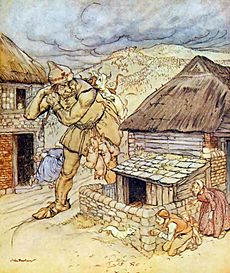
Pauline Baynes also worked with another very famous author, J.R.R. Tolkien. He created the worlds of The Lord of the Rings and The Hobbit. She illustrated his book Farmer Giles of Ham. This is a funny story about a farmer who accidentally becomes a hero.
Tolkien was very happy with Pauline Baynes' illustrations. He praised how well she captured the spirit of his story.
Pauline Baynes' Unique Style
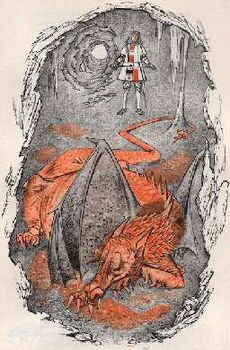
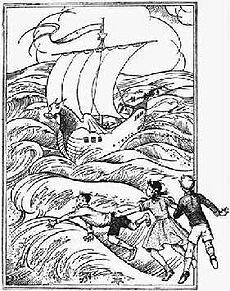
Pauline Baynes had a very special drawing style. Her illustrations were easy to recognize. Her drawings were full of tiny details, but they also had a fun, charming feel. She often used bright colors and detailed patterns in her artwork.
Her characters always showed a lot of emotion and personality. You could often tell what they were thinking just by looking at their faces.
Awards and Recognition
Pauline Baynes' work received many awards and honors. She won the Kate Greenaway Medal in 1968. This was for her illustrations in A Dictionary of Chivalry. The Kate Greenaway Medal is one of the most important awards in children's literature.
Her illustrations have also been shown in museums and art galleries around the world. She is considered one of the most important children's book illustrators of the 20th century.
Pauline Baynes as an Author
Later in her life, Pauline Baynes started to write her own books. She loved animals, so some of her books were about them. These included The Elephant's Ball and How Dog Began. She also wrote books inspired by her interest in religion. Some of these were Good King Wenceslas and Noah and the Ark.
Personal Life
In 1961, Pauline Baynes married Friedrich Otto Gasch, who was known as Fritz. Fritz was from Germany and had served in the war. After the war, he decided to live in England. Pauline and Fritz got married on March 18, 1961. They lived in a place called Rock Barn Cottage in Dockenfield. Fritz passed away in 1988.
Death
Pauline Baynes died in Dockenfield on August 1, 2008. She left behind some illustrations that were not yet published.
Her Lasting Impact
Pauline Baynes' illustrations have had a big and lasting impact on children's books. Her work has inspired many other artists and writers. Her pictures continue to be loved by readers of all ages.
She showed everyone how important pictures are in telling a story. Her art helped make the worlds of Narnia and other books even more magical and memorable for children everywhere.
Interesting Facts About Pauline Baynes
- When she was at the Slade School of Fine Art, Pauline Baynes spent more time on "coffee and parties" than on studying!
- Pauline told Tolkien that her favorite poem in The Adventures of Tom Bombadil was The Hoard. She only much later found out that her drawing for that poem had disappointed him. He thought her dragon and knight looked unrealistic.
- C.S. Lewis chose Pauline Baynes to illustrate his Narnia stories after he saw and liked her artwork for Farmer Giles of Ham. A bookshop assistant also encouraged him to pick her.
- Companies hired Pauline Baynes to design Christmas cards. Some of these cards are still printed and sold many years after she painted them! She also designed advertisements for biscuits.
Images for kids
See also
 In Spanish: Pauline Baynes para niños
In Spanish: Pauline Baynes para niños
 | Jessica Watkins |
 | Robert Henry Lawrence Jr. |
 | Mae Jemison |
 | Sian Proctor |
 | Guion Bluford |




